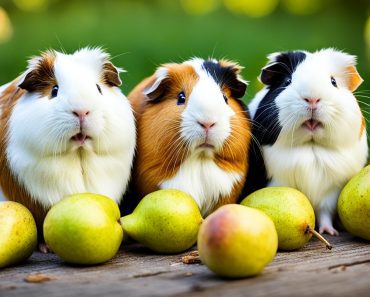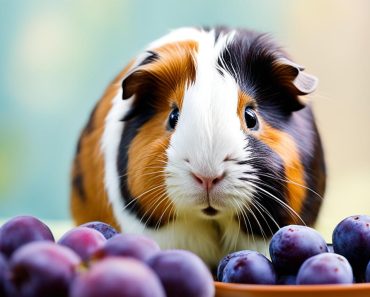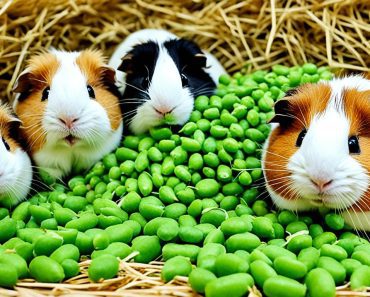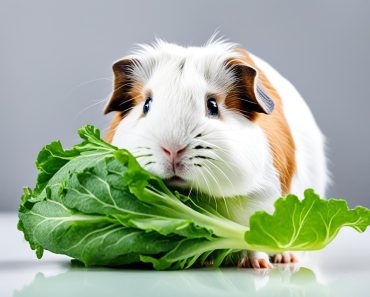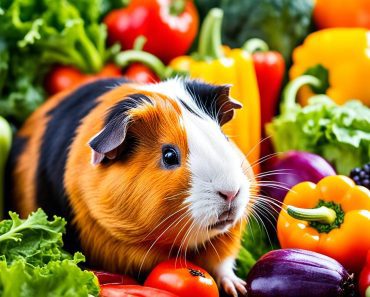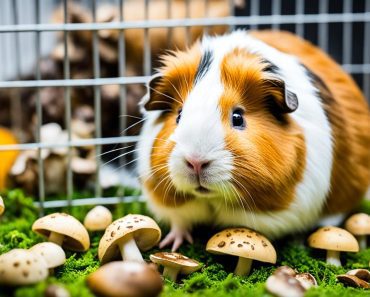Hey there, fellow guinea pig enthusiasts! Today, I want to address a popular question among guinea pig owners: can guinea pigs eat cantaloupe? Well, the answer is yes, they can! But there are a few things you need to know before serving up this summery fruit to your adorable little piggies. Let’s dive in!
Cantaloupe is not only tasty for us humans, but it can also be a delightful treat for guinea pigs. It’s packed with Vitamin C, an essential nutrient that guinea pigs need to stay healthy. However, it’s important to keep in mind that cantaloupe, like other fruits, should only be offered in moderation due to its high sugar content. Your guinea pigs should enjoy cantaloupe as an occasional indulgence, a couple of times a week at most.
When serving cantaloupe to your guinea pigs, remember to peel off the skin and remove any seeds. These parts of the fruit can be a choking hazard or cause digestive issues. Cut the cantaloupe into bite-sized pieces, making it easier for your piggies to enjoy without any difficulties. And, of course, always remove any uneaten cantaloupe to prevent spoilage.
Can Guinea Pigs Eat Cantaloupe? Yes, they can when offered in moderation.
- Cantaloupe can be a safe and tasty treat for guinea pigs, thanks to its high Vitamin C content.
- Feed cantaloupe to guinea pigs in limited amounts, as it is high in sugar.
- Remove the skin and seeds of cantaloupe before serving to guinea pigs.
- Cut cantaloupe into bite-sized pieces to prevent choking.
- Dispose of any uneaten cantaloupe to avoid spoilage.
The Guinea Pig Diet Basics
When it comes to taking care of your guinea pig, providing a proper diet is essential for their overall health and well-being. The right combination of foods ensures that your furry friend receives all the necessary nutrients for a balanced diet.
The daily diet of a guinea pig should consist of:
- 75% good quality hay: Choose from options such as Timothy, meadow, or oat hay. This is crucial for their dental health and digestion. Hay also helps wear down their continuously growing teeth.
- 1/2 to 1 cup of vegetables: Incorporate a variety of vegetables into your guinea pig’s diet, including leaf lettuce, carrots, tomatoes, parsley, and dandelion greens. These veggies provide essential vitamins and minerals.
- Moderate amount of dark, leafy greens: While spinach is rich in nutrients, it should be given in moderation to prevent bladder stone formation. Other suitable options include kale and romaine lettuce.
- 1-2 tablespoons of guinea pig pellets: Choose pellets specifically formulated for guinea pigs, as they contain the necessary nutrients. Look for pellets fortified with Vitamin C, an essential nutrient that guinea pigs cannot produce on their own.
As for treats, occasional fruits can be given, such as apples and berries. However, it’s important to remember that fruits should only make up a small portion of their diet due to their high sugar content.
Lastly, guinea pigs should have unlimited access to fresh water and may require a Vitamin C supplement, especially if their pellets do not provide sufficient amounts of this vital nutrient.
I always make sure my guinea pig has a good supply of fresh hay to chew on. It’s not only important for their dental health but also keeps them entertained.
– Sarah, guinea pig owner
Pellets Comparison Table
Here’s a comparison table of some popular guinea pig pellet brands:
| Brand | Key Features | Ingredients | Price (per pound) |
|---|---|---|---|
| Oxbow Essentials | Fortified with Vitamin C, high in fiber | Timothy grass, soybean hulls, wheat middlings | $3.99 |
| Kaytee Forti-Diet | Contains probiotics for digestive health | Alfalfa meal, wheat middlings, corn | $2.99 |
| Mazuri Guinea Pig Diet | Optimal pellet size for guinea pigs | Dehydrated alfalfa meal, corn, soybean hulls | $4.49 |
Remember to consult your veterinarian for personalized advice on your guinea pig’s diet based on their specific needs and health conditions.
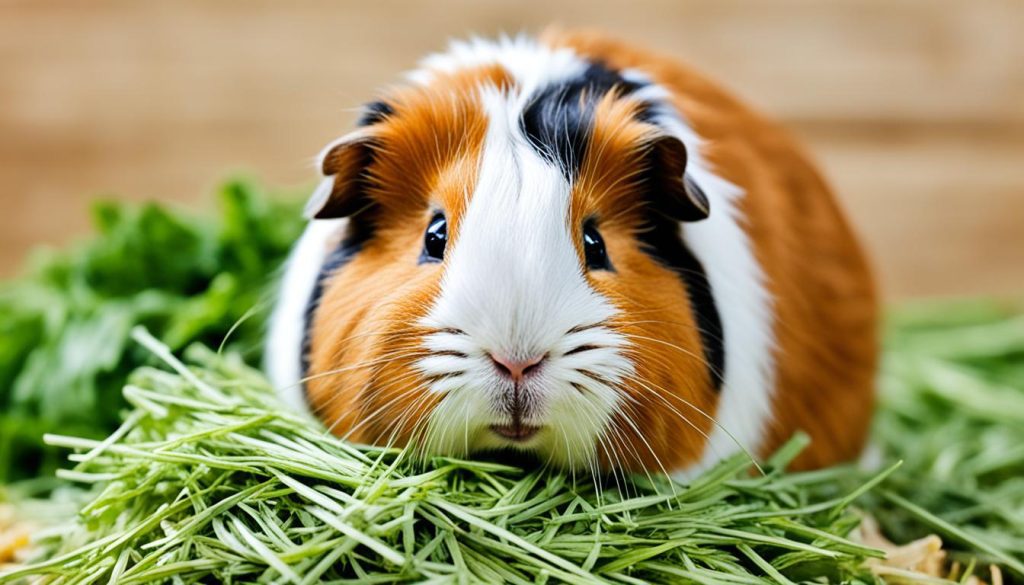
The Good and Bad of Feeding Cantaloupe to Guinea Pigs
The good news is that cantaloupe is safe for guinea pigs to eat and offers some nutritional benefits. Cantaloupe is high in Vitamin C, which is essential for guinea pigs as they cannot produce it themselves. However, it is important to note that fruit, including cantaloupe, should only be offered as a treat and not make up a large part of a guinea pig’s daily diet. This is because fruit is high in sugar, which can upset a guinea pig’s digestion and lead to obesity. Cantaloupe and other fruits should be offered to guinea pigs a couple of times a week, if at all.
Nutritional Benefits of Cantaloupe for Guinea Pigs
Cantaloupe is a good source of Vitamin C, which is important for guinea pigs’ overall health and immune system. As guinea pigs cannot produce Vitamin C on their own, it is crucial to provide them with a dietary source of this essential vitamin. Including small amounts of cantaloupe in their diet can help meet their Vitamin C requirements.
“Cantaloupe provides guinea pigs with a tasty and refreshing treat that also provides important nutrients. However, moderation is key to prevent health issues related to excessive sugar consumption.”
Limitations of Feeding Cantaloupe to Guinea Pigs
While cantaloupe has its benefits, it should still be treated as a treat rather than a staple food in a guinea pig’s diet. The high sugar content in cantaloupe can lead to digestive issues, obesity, and other health problems. Therefore, it is important to offer cantaloupe in moderation and ensure that it does not make up a significant portion of their daily food intake.
| Nutrient | Amount |
|---|---|
| Vitamin C | 29.1 mg |
| Carbohydrates | 8.16 g |
| Fiber | 0.9 g |
| Protein | 0.84 g |
| Fat | 0.19 g |
| Calories | 34 kcal |
Best Practices for Feeding Cantaloupe to Guinea Pigs
- Offer cantaloupe in small, bite-sized pieces to prevent choking hazards.
- Remove any uneaten cantaloupe after a few hours to prevent spoilage.
- Introduce cantaloupe gradually into your guinea pig’s diet to observe any digestive issues.
- Always consult with a veterinarian before making any significant changes to your guinea pig’s diet.
What Foods Should Guinea Pigs Avoid?
When it comes to guinea pig care and diet, it’s important to know which foods are safe and which ones are best avoided. As herbivores, guinea pigs should never be offered meat or animal products. It’s also crucial to avoid giving them pellet diets formulated for other species, such as rabbits. Here’s a list of foods that should be avoided:
- Bread, crackers, cereal, and other high-starch foods
- Peas and corn, as they can cause digestive issues
Additionally, it is important to steer clear of feeding guinea pigs spoiled food or unwashed fruits and vegetables. These can be harmful to their health and should be strictly avoided. When introducing new foods to your guinea pig’s diet, always consult with a veterinarian for proper advice and guidance. Remember, the well-being and safety of your furry friend should always be a priority.
| Foods to Avoid | Reasons to Avoid |
|---|---|
| Bread, crackers, cereal, and other high-starch foods | Can lead to digestive issues |
| Peas and corn | Can cause digestive issues |
| Spoiled food or unwashed fruits and vegetables | Harmful to guinea pig’s health |
Conclusion
Providing a balanced and nutritious diet is essential for the overall health and well-being of your guinea pig. While cantaloupe can be safely included as an occasional treat due to its high Vitamin C content, it should be offered in limited amounts due to its high sugar content. The bulk of your guinea pig’s diet should consist of hay, vegetables, and pellets that are specifically formulated for guinea pigs.
Remember to avoid overfeeding fruits, including cantaloupe, as they should only be given as healthy snacks for guinea pigs. It is important to be mindful of portion sizes and to prioritize the intake of key nutrients, such as Vitamin C. Consulting with a veterinarian is always a good idea if you have any concerns or questions about your guinea pig’s diet or overall care.
By following a proper guinea pig diet and providing the necessary care, you can ensure that your furry friend remains healthy, happy, and vibrant for years to come. Make sure to offer a variety of vegetables, provide a constant supply of fresh water, and give them regular exercise and mental stimulation to promote their overall well-being.

